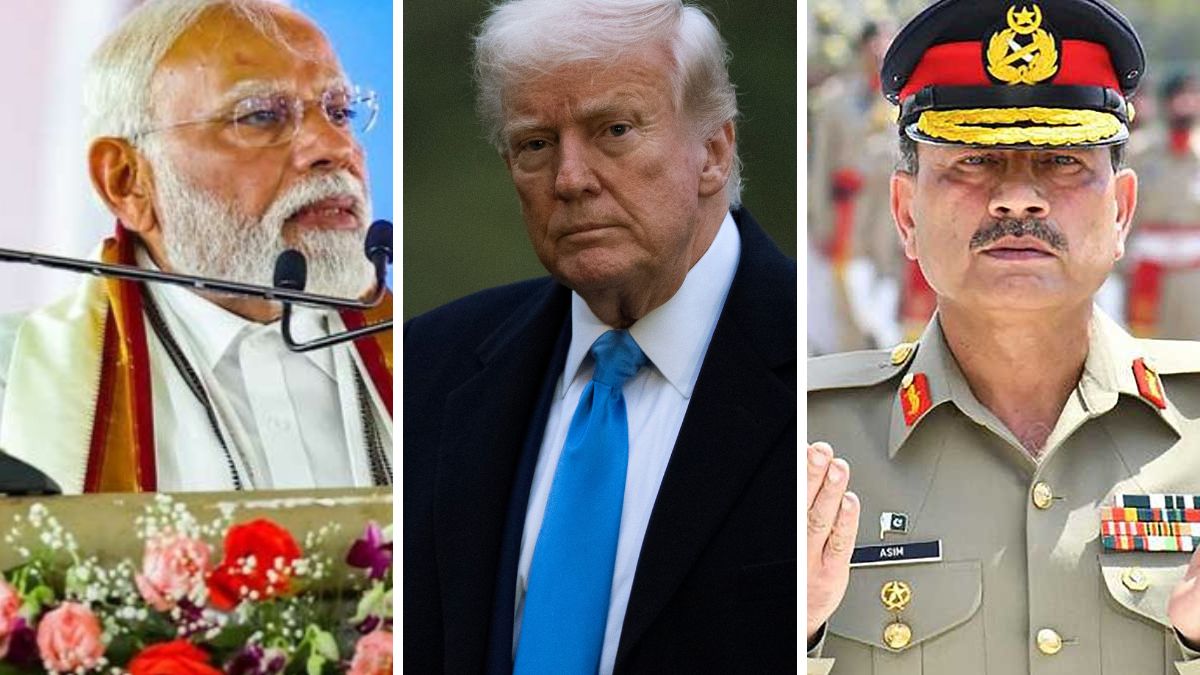What did Trump discuss with PM Modi ahead of his meeting with Pakistan Army chief Asim Munir?
 Prime Minister Narendra Modi, US President Donald Trump and Pakistan Army chief Asim Munir | X
Prime Minister Narendra Modi, US President Donald Trump and Pakistan Army chief Asim Munir | X
Pakistan's Chief of Army Staff Asim Munir will meet US President Donald Trump at the White House on Wednesday, according to reports. The private luncheon will be held in the Cabinet Room and no press access has been permitted.
Interestingly, Trump dialled Modi on Wednesday morning, hours before his meeting with Munir where the duo is said to have discussed the Pahalgam terror incident and Operation Sindoor.
Foreign Secretary Vikram Misri said the call was carried out at the request of the US President. Their conversation reportedly focused on the Pahalgam issue and Operation Sindoor, which Modi said "still continues."
The Prime Minister is also said to have informed Trump about India's new counter-terror policy, which is treating terrorism as an act of war and not proxy action.
Modi is also said to have informed Trump that India has never "accepted third-party mediation and will not accept such mediation in the future." However, no topics related to trade were addressed.
The Foreign Secretary said that Trump extended an invitation to PM Modi, however, the Prime Minister could not accept the invitation due to prior commitments. "President Trump invited PM Modi to meet during his current visit to the USA, but due to a pre-existing schedule, PM Modi was unable to accept the invitation. Both leaders agreed to meet in the near future," Misri said.
Munir's visit
Though the Pakistan Army has often had a close relationship with the US, this visit is said to be "bilateral" in nature. The Pakistani military leader is also expected to meet with Secretary of State Marco Rubio and Defence Secretary Pete Hegseth on his US trip, according to reports.
But, Munir's visit to the US has garnered eyeballs as it comes soon after the India-Pakistan conflict and the US clearing the air about extending an invite to Munir for Trump's military parade. Pakistani website Dawn also jumped to justify that Munir's visit was "not officially linked to the US Army’s 250th-anniversary celebrations on June 14, despite its timing".
Dawn also attempted to hint that Munir spent the last two days at the US Central Command’s headquarters in Tampa, Florida. Neither Pakistan nor the US confirmed the claim.
Though Pakistan claims the visit was purely bilateral, Islamabad is in a hurry to portray it as a "diplomatic win", trying to compare it with US Vice President J D Vance's India visit. A Dawn report stated that during Vance's visit, many "contrasted it with the apparent inability of the Pakistani delegation to secure a similar meeting" though India's sole focus was on its relations with the US.
Despite all this false bravado, the conversation with Trump isn't going to be an enjoyable one for Munir, according to experts. Though the Army Chief aims to reinforce military and strategic ties with the US, Michael Kugelman, a Washington-based South Asia analyst, believes it will be "complicated by the regional tensions."
Kugelman told Dawn that the US wouldn't appreciate Pakistan condemning Israeli strikes and strengthening ties with Tehran, all the while trying to cultivate US support. "For Gen Munir to be in the capital of Israel’s closest ally and Iran’s primary adversary at such a tense moment could lead to some uncomfortable conversations," Kugelman added.
Interestingly, Munir, during his US visit, publicly supported Iran, in an event with the Pakistani diaspora. Giving contrasting messages, Munir said Pakistan's "clear and strong" support was with Iran while it also backed the US "in deescalating the situation".
This balancing act may limit how fully US officials can engage with the visiting Pakistani delegation, in the unfolding Middle East.
Shuja Nawaz, a distinguished fellow at the Atlantic Council’s South Asia Centre, told Dawn that the US sees Pakistan in the China camp but as a useful counterterrorism base. "It sees greater trade and markets for its technology and defence materials in India. This makes an unequal situation,” Nawaz added.
India